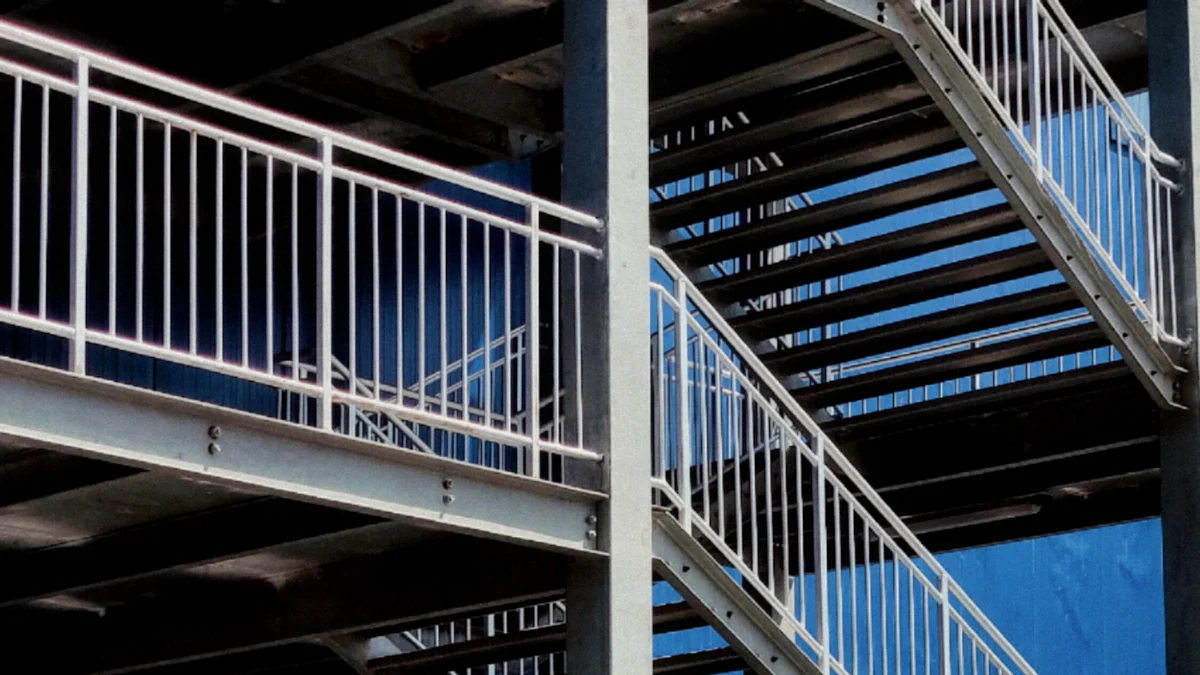
Aluminum stairs and ramps provide essential access solutions for individuals with mobility challenges. These structures, made from high-quality materials like aluminum and stainless steel, offer durability and strength in various settings. The importance of accessibility solutions cannot be overstated, especially when considering the need for safe and reliable access to buildings or structures. Throughout this blog, the surprising benefits of aluminum stairs and ramps will be explored, shedding light on their versatility, safety features, and compliance with ADA guidelines.
1. Durability and Strength

When considering aluminum stairs and ramps, durability and strength are paramount features that ensure long-lasting performance. The high-quality materials used in their construction, such as aluminum and stainless steel, contribute significantly to their robustness.
Aluminum Construction: The use of aluminum in these structures provides exceptional durability. Aluminum’s natural corrosion resistance, attributed to a thin oxide layer on its surface, makes it ideal for outdoor applications. Its malleability allows for bending without cracking, ensuring structural integrity over time.
Stainless Steel Fasteners: Stainless steel fasteners further enhance the strength of aluminum stairs and ramps. These fasteners provide secure connections between components, increasing the overall stability of the structure. Their resistance to corrosion complements the longevity of the ramps and stairs, making them reliable solutions for various environments.
In terms of long-lasting performance, aluminum stairs and ramps excel due to their ability to withstand pressure, weather conditions, and daily wear and tear. The resistance to corrosion ensures that these structures maintain their aesthetic appeal even after prolonged use.
Resistance to Corrosion: Aluminum’s inherent properties make it resistant to rust and deterioration caused by environmental factors. This resistance prolongs the lifespan of the stairs and ramps, reducing the need for frequent maintenance or replacements.
Minimal Maintenance: With minimal maintenance requirements, aluminum stairs and ramps offer a cost-effective accessibility solution. Regular cleaning and inspections are usually sufficient to keep these structures in optimal condition, saving both time and resources in the long run.
The combination of high-quality materials, including aluminum and stainless steel fasteners, ensures that aluminum stairs and ramps provide durable access solutions that require minimal upkeep while maintaining their strength over time.
2. Versatility and Customization
Various Configurations
Aluminum’s versatility extends to its various configurations, allowing for tailored solutions to meet specific accessibility needs. From different step counts to handrail options, aluminum stairs and ramps offer customizable features that enhance user experience and safety.
- Different Step Counts
- Aluminum stairs can be designed with varying step counts to accommodate different heights and space constraints. Whether it’s a few steps or a more extensive staircase, the flexibility in design ensures seamless integration into diverse environments.
- The adaptability of aluminum stairs with different step counts makes them suitable for both temporary and permanent installations, providing practical solutions for individuals with mobility challenges.
- Handrail Options
- Handrails play a crucial role in enhancing the safety and usability of aluminum stairs and ramps. With customizable handrail options, users can choose between different styles, materials, and heights to ensure optimal support and stability.
- ADA guidelines emphasize the importance of handrails in promoting accessibility for individuals with disabilities. By offering various handrail configurations, aluminum ramps cater to a wide range of users while maintaining compliance with regulatory standards.
Easy Installation and Portability
The ease of installation and portability are key advantages of aluminum stairs and ramps, making them convenient solutions for temporary access needs in multiple locations.
- Temporary Use
- Aluminum ramps are designed for quick assembly and disassembly, allowing for temporary installations as needed. This feature is particularly beneficial for events, construction sites, or any situation requiring short-term access solutions.
- The portability of aluminum ramps facilitates their relocation to different areas within a facility or across various sites without compromising on structural integrity or safety.
- Multiple Locations
- The versatility of aluminum stairs enables them to be utilized in diverse settings such as commercial spaces, public venues, or residential properties. Their lightweight yet durable construction makes them ideal for applications where mobility solutions are required on a temporary basis.
- By offering easy installation and portability, aluminum stairs and ramps provide flexible accessibility options that can adapt to changing needs without extensive modifications or disruptions.
3. Safety and Compliance

ADA Guidelines
Ensuring aluminum stairs and ramps comply with the Americans with Disabilities Act (ADA) guidelines is essential for promoting accessibility and inclusivity. These guidelines outline specific requirements for wheelchair and scooter accessibility, emphasizing the importance of creating barrier-free environments for individuals with mobility challenges.
Wheelchair Accessibility
- Providing adequate width for wheelchair users to navigate comfortably is a fundamental aspect of ADA compliance. Aluminum ramps must have a minimum clear width to accommodate standard wheelchair dimensions, allowing users to move safely and independently.
- In addition to width, the slope of aluminum ramps plays a crucial role in wheelchair accessibility. ADA guidelines specify maximum slope ratios to ensure smooth transitions for wheelchair users without compromising safety or usability.
Scooter Accessibility
- Beyond wheelchair access, ADA guidelines also consider the needs of individuals using scooters or other mobility devices. Aluminum ramps should be designed with stability and maneuverability in mind, enabling scooter users to navigate inclines safely.
- The presence of handrails on aluminum stairs and ramps further enhances scooter accessibility by providing additional support and guidance during ascent and descent. By incorporating these features, manufacturers can create inclusive solutions that cater to a diverse range of mobility needs.
Stability and Safety Features
Prioritizing stability and safety features in the design of aluminum stairs and ramps is paramount to ensure user confidence and prevent accidents. Incorporating non-slip surfaces and secure handrails enhances the overall safety profile of these structures, aligning them with industry standards for accessibility.
Non-Slip Surfaces
- Implementing non-slip surfaces on aluminum stairs minimizes the risk of slips or falls, especially in wet or slippery conditions. Textured finishes or anti-slip coatings provide traction for users, reducing the likelihood of accidents and enhancing overall user experience.
- By adhering to ADA guidelines regarding slip resistance, manufacturers can create aluminum stairs that prioritize user safety without compromising on aesthetics or functionality. These surfaces offer peace of mind to individuals navigating inclines or steps in various environments.
Secure Handrails
- Secure handrails are integral components of aluminum ramps, offering stability and support for users during vertical transitions. Properly installed handrails guide individuals along the ramp’s path, ensuring a safe journey from start to finish.
- ADA guidelines emphasize the importance of handrail height, diameter, and continuity along aluminum ramps, setting standards that enhance usability for individuals with different abilities. By incorporating secure handrails into their designs, manufacturers demonstrate a commitment to safety and compliance with accessibility regulations.
Aluminum is a trusted metal known for its sustainability and industrial applications. Its incredible ability to perform in extreme conditions makes it a top choice for various industries, from construction to transport and food processing. The strength and durability of aluminum are unmatched, with natural corrosion resistance and the flexibility to withstand pressure, weather changes, and damage. Its malleability allows for bending without cracking, ensuring long-lasting performance in diverse environments. As advancements continue in aluminum technology, future considerations should focus on enhancing its versatility and customization options to meet evolving accessibility needs effectively.









